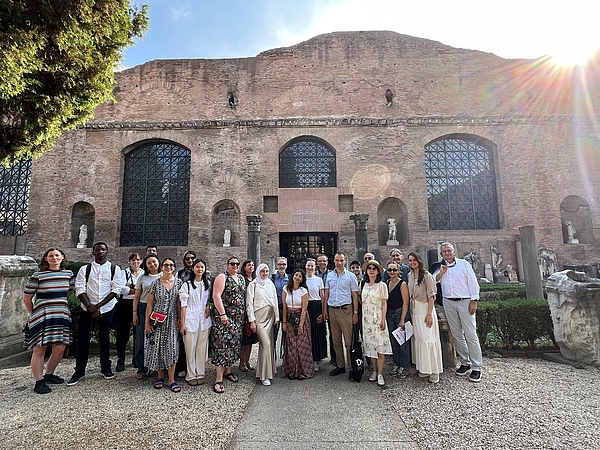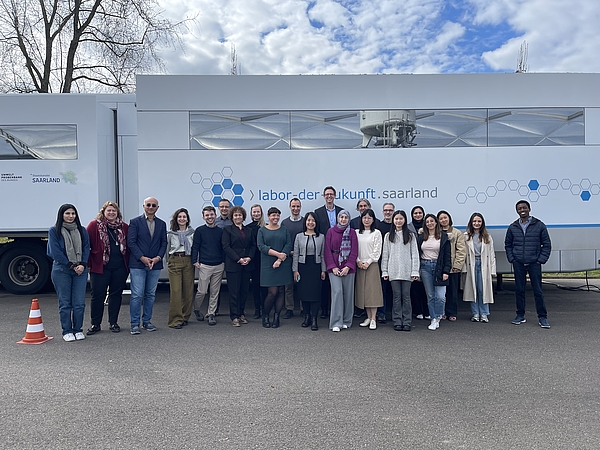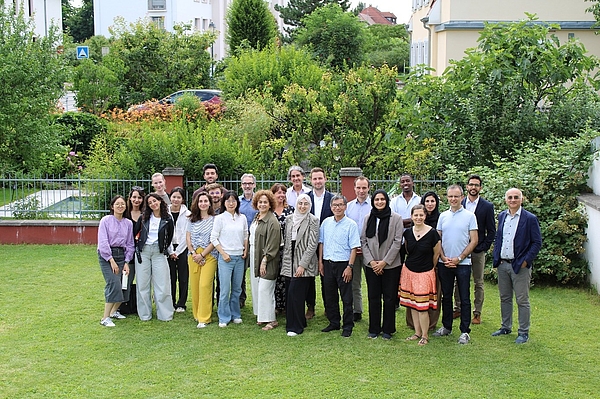Training
CombiDiag brings together leading academic and industrial experts across Europe and worldwide and uses their synergies to build an interdisciplinary, intersectoral and international triple-i research and training platform for the training of a new generation of scientists to take the peripheral biomarker based early AD diagnostic research to a new level.

Local Training Courses
CombiDiag Fellows are encouraged to attend the relevant local PhD training courses at partner institutions and aquire skills such as, how to write and present scientific papers, research proposal, technique reports and PhD thesis; how to write patents and handle IPR issues, technology transfer and enterprise; general IT skills, reference management, time management and teamwork.

Research Training
Specific training programmes are tailored for each individual Fellow based on the nature of the research project and personal experience.
They are accompanied by regular supervisory meetings, research skill trainings, personal mentoring and a personalized career development plan based on the Vitae RDF.

Network Training
The network level training events focus on joint activities with shared resources and learning, including regular webinars, residential workshops, an autumn school, research symposiums and international conferences.
Training Events
Archive
CombiDiag Symposium at Alzheimer Europe

CombiDiag held a symposium on 7 October 2025 at the Alzheimer Europe Conference in Bologna in the Avorio and presented the research status of all ten CombiDiag Fellows.
Workshop at Sapienza University in Rome
Standardization of Peripheral Biomarkers for Alzheimer’s Disease: ‘Taking Care’ in the European Union
Marie S. Curie Doctoral Network Project – CombiDiag
Date: June 16–19, 2025 Location: Sapienza University of Rome, Department of Physiology and Pharmacology “V. Erspamer”
As part of the European Horizon Marie S. Curie Doctoral Network project Peripheral Biomarker Based Combinatorial Early Diagnostics for Dementia (CombiDiag), Professor Claudio Babiloni’s research group hosted an international workshop titled “Standardization of Peripheral Biomarkers for Alzheimer’s Disease: ‘Taking Care’ in the European Union.” The event took place from June 16 to 19, 2025, at the Department of Physiology and Pharmacology “V. Erspamer” (Building CU024), Sapienza University of Rome.
The workshop focused on early diagnostics of dementia using peripheral biomarkers, bringing together researchers from academic and non-academic institutions across Italy, France, Germany, Turkey, Spain, Denmark, and the United Kingdom. It served as a platform to exchange knowledge and promote collaboration on various topics including biomarker discovery, standardization and harmonization across centers, clinical qualification strategies, and the development of business models for Alzheimer’s disease diagnostics. The workshop welcomed a diverse set of stakeholders such as pharmaceutical companies, public regulatory agencies, and patient advocacy organizations.
The scientific program included expert presentations, panel discussions, and practical sessions aimed at fostering translational research and shaping future directions in biomarker-based diagnostics. Attendees explored the integration of scientific innovation with health policy and commercial applications, emphasizing the importance of cross-sectoral cooperation.
In addition to the core workshop, three open symposia were held to engage the broader public and address socially relevant themes:
“Yoga as a Healthy Lifestyle: Focus on Breathing” was held on June 16 in Classroom A. The session explored how yoga practices can reduce dementia risk factors such as sedentary habits, cardiovascular stress, high-calorie diets, and sleep disturbances. It concluded with a practical breathing exercise to demonstrate its therapeutic potential.
“Europe Meets Migrants”, conducted on June 18 in Room A, examined the implications of international migration on European society through the lenses of economics and neuroscience. The session concluded with a performance by the Concentus Vocalis choir titled “War and Migrants”, portraying themes of conflict, displacement, and resilience.
“Women in Science of Dementia Biomarkers: Successful Stories” took place on June 19 in Room B, highlighting the journeys of three distinguished neuroscientists who overcame gender-related barriers in academia. Their inspiring stories underscored the need for gender equity and offered encouragement to both current and future researchers.
In summary, the workshop successfully advanced dialogue on standardizing peripheral biomarkers for Alzheimer’s disease and demonstrated the power of inclusive, multidisciplinary collaboration in shaping the future of dementia diagnostics

Workshop Agenda
Workshop at Fraunhofer IBMT
The CombiDiag Workshop held at the Fraunhofer Institute for Biomedical Engineering (IBMT) in Sulzbach from March 24 to 26, 2025, brought together leading experts, researchers, and industry stakeholders to discuss the latest advancements in Alzheimer's Disease (AD) diagnostics and therapies.
One of the key highlights of the workshop was the dynamic presentations by doctoral candidates from the participating DC organizations, who shared their innovative PhD proposals and engaged in interactive discussions with the audience to receive valuable feedback for further development.
Participants also had the opportunity to visit Fraunhofer's state-of-the-art laboratories and explore the cutting-edge technology of the mobile lab, showcasing the institute's commitment to advancing research in AD diagnostics and therapies.
The workshop served as a hub for knowledge transfer, covering essential topics such as market overview, political and societal impact of AD diagnostics and therapies, and authorization procedures for medical devices. Experts and attendees engaged in insightful discussions to enhance their understanding and drive forward progress in the fight against Alzheimer's Disease.

Workshop Agenda
CombiDiag Summer School 2024
From June 24 to 27, 2024, Firalis hosted at its premises in Huningue/France CombiDiag’s second training event. The summer school provided an opportunity for CombiDiag DCs to present their thesis projects and latest advances in their research. Participants also benefited from lectures delivered by field experts on peripheral biomarkers and their combinatorial use in diagnosing early-stage Alzheimer’s disease. These sessions offered in-depth knowledge and cutting-edge advancements in the field, equipping the DCs with a comprehensive understanding of the latest research trends and methodologies.
Beyond the academic discussions, the Summer School included a tour of the Firalis premises, allowing DCs to gain a deeper understanding of the company's activities, technological capabilities, and ongoing projects.

Workshop Agenda
CombiDiag Autumn School 2023
The first networking training event for CombiDiag‘s fellows took place from October 16th to 17th, 2023 at the UCA premises in Nice. During the two days, the fellows had the opportunity to give an insight into their planned dissertation topics through lectures, as well as to achieve a good multidisciplinary foundation knowledge on research ethics and an introduction to the Researcher Development Framework (Vitae RDF). Additionally, through a tour of the Memory Clinic premises and team building activities, the fellows and the supervisors had the opportunity to get to know each other.




